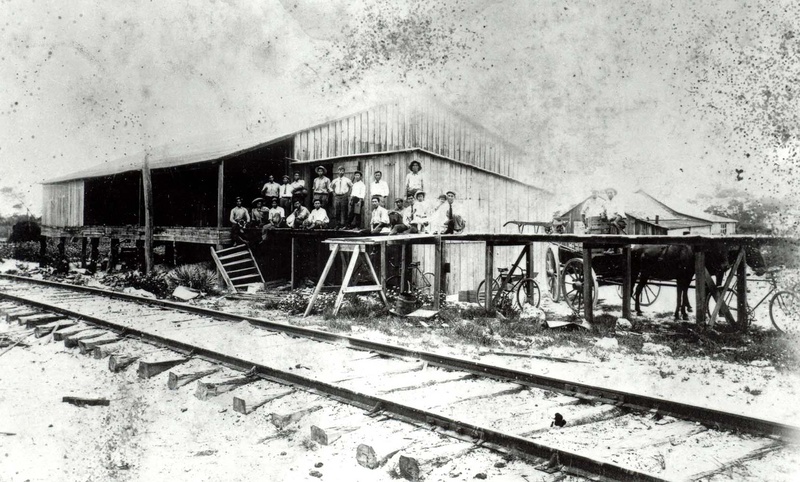Morikami Sukeji, who came to America as a member of the Yamato Colony in South Florida and remained there alone until the end of his life after the colony was disbanded, continued to write letters to his sister-in-law and her family after the war. In his letters, he expresses his affection for them, who have become like family to him, and confides his conflicting feelings towards his sister-in-law, such as worries about their health and their future.
* * * * *
Month/Day/1950
It's just two o'clock in the morning. I didn't cough much tonight and slept well. I apologize for the long absence. The weather has been unstable and last Friday morning there was the tenth frost this winter. The eleventh cold front is wandering around due to the pressure of the Atlantic Ocean.
My condition worsened and I was worried I might develop pneumonia, but my coughing has subsided and my appetite has returned, so I think I'm okay. If you're raised on rice, you need rice in times of emergency. I've been living on rice porridge and pickles for a long time. By pickles I mean eggplant and onion finely chopped, fried with salt, and seasoned with sugar and soy sauce, a kind of fukujin-zuke. It's an old story, but in the mountains of Tosa, where there is no rice, when a sick person takes their last breath, they put rice in a bamboo tube and shake it to hear the sound, so that the sick person will die satisfied that they have no regrets in this world. Everyone, please be careful and don't get sick.
Record-breaking cold wave, snow falling
Thank you for your letter. I'm sorry for making you worry. My appetite has returned and the headache has subsided, but I'm worried because I can't stop coughing. I think it's what they call whooping cough in Japan. I went to Movie for the first time in a while last night, but I started coughing so I had to leave halfway through.
The cold wave we were worried about finally hit us last Friday night, with winds blowing at nearly 50 miles per hour, and with the addition of rain, it was so cold that we could barely sleep. There was no frost because of the rain, but the cold wind and rain damaged the crops. They are completely half dead. The remaining millions of tomato and pepper seedlings have only just sprouted, so they are almost completely destroyed. This cold wave broke all records, and snow fell all over central Florida and north, with up to two inches of snow accumulating in some places.
5000 head of cattle froze to death on a ranch 50 miles northwest of our city. I have never seen such cold weather in my time in America. I am working hard, even giving my last dollar. The outcome will be decided in three weeks. It is fate whether we win or lose. I have done my best. I will not cry or complain.
Mi-san, I won't forget you even though we haven't been in touch for a while. Please don't worry. I'm fine.
* * * * *
I received your letter. What pains me most is that I cannot do anything to repay you for thinking of me so much. I want to see you. I want to be called husband and father. I am once again running around trying my luck in this letter. This letter is full of bad things, and I cannot write anything that will make you happy, so I feel guilty about writing you and I am scared. I hope you can understand.
Due to the postwar recession and bad weather, farmers in this region are in a difficult situation and nothing good seems to be happening, but the bad will not last. I think that in the not-too-distant future we will be able to laugh together.
Mi-san, I just got home from town and it's a little too early to go to bed, so I decided to write something. Today, for the first time in a while, there was no rain, and a cool breeze came from the Atlantic all day, so I hardly felt the heat. I worked until about 7pm, plowing 10 acres of land length and width with a tractor. I didn't feel tired at all. Ten acres is about 4 chobu in Japan, or 640 ft square. If I plowed with a horse, it would take at least 10 days.
The expenses were very little, 10 gallons of gas and 1 quart of oil, 2 dollars and 50 cents. There was no need to walk or yell like with horse plowing, it was not much different from driving a car. It was past 3 o'clock and I was getting a little hungry. I felt like you were holding Aki-chan's hand in one hand and carrying a lunch box in the other. You may think it's a daydream again, but it's true, so there's nothing I can do about it.
Lately, maybe because of the weather, nothing I eat has any taste. I miss Japanese rice, pickled vegetables, and hot bancha tea. I had dinner at a restaurant again tonight. I didn't even eat half of it. Lillian (everyone calls her Lil), who always serves me, said...
Far from losing weight, I've actually gained a lot of weight recently. Yesterday, I washed my kimono for the first time in a while. The black lady who comes once a week had a new baby, so she won't be coming this week, so I did a week's worth of laundry myself. Five shirts, five pairs of trousers, two sheets, two pillow slips, five towels, six handkerchiefs, and eight and a half pairs of socks. I'm sure I have nine pairs, but I just can't find one of them. Maybe the neighbor's spotty (puppy) took it. I've been trying for ages but I can't find one of my slippers. The next morning, the neighbor's wife came to return them. Even though she's next door, there's still more than a mile of them.
<When a beautiful woman tells your fortune>
I am currently preparing to plant watermelons and cucumbers in about 10 square meters. Once I finish planting, I plan to go on a two-week trip. It is for business of course, but in the past (about 15 years) when I was in business, I traveled for one or two months every summer. One summer, probably the year before I built my house, I went by ship to Baltimore, arrived in Washington, and... ran away because it was so hot. On the ship, I got to know a young woman.
She was enrolled at a university in Georgia and was returning home for the summer. She was a lady of a good family, dressed simply, and had a face like a Greek statue. She said she was studying palm reading, so she looked at mine. Then she said the following.
"You are Japanese, and quite fond of reading. Most Japanese people are fond of reading (very detailed). You have the omens to become very rich. In fact, you already are. But if you are not careful, you will end up penniless. Then you may suffer from a serious illness that could be life or death. You will live a long life and marry very late."
I didn't pay her any attention at the time, but as the years go by, it seems like her predictions have come true one by one. I am especially skeptical of the last two.
* * * * *
Mi-san, I will sort out my assets for now. I would like you to let me know the amount you think you will need for a year from now on. I can't send you the whole amount at once, but if you send it in monthly or bimonthly installments, you won't have to worry about being billed. If I can't do that, I will definitely have my lawyer friend send the money. In fact, there is nothing more unpleasant than asking for money advice. I sometimes go out to ask for loans, but it is really hard for me, who is timid.
Although I have set a fixed amount for the remittance, I will send as much as possible within my financial means.
Our first generation of Koreans in America are also dying one after another. Today's newspaper also reported the suicide by drowning of a certain Fujiki (70 years old). In his suicide note he wrote, "I am old and cannot work, I have no money, and I am now leaving." What a tragedy. He, too, had come to America with high hopes. I was deeply moved as I reflected on my own life.
I live in a region where there are few Japanese people, so I have never heard of Naniwabushi or seen a Japanese movie. However, I heard that Kinuyo (note) has become a big fan of America, and seems to be proud of the way foreigners speak in broken Japanese, such as walking around in sunglasses on a rainy day, acting cuckoo as if she can't hold chopsticks properly, and saying things like "I came to that place." 1
I'm feeling a little sleepy. That's it for tonight. Good night. (June 10th, 11:14pm).
* * * * *
Your letter of the 9th arrived this morning (13th). As a single person, your letter is the greatest comfort to me. Even though I know it hasn't arrived yet, I still feel disheartened every time I open my mailbox. I think the letter I sent you on the 7th has already arrived. Money orders are sometimes delayed and can take more than 40 days. Please let me know when it arrives.
Mi-san, I have decided not to go to South America. I have forgotten my age. I feel young, but my body is not ready. People are people, and we want to live by helping each other. Japanese people living in the United States are finally in the process of applying for naturalization. I am not sure what to do.
A lonely person misses his hometown. I may suddenly return to Japan and surprise you. I have updated you on my current situation several times. You may have thought that I was whining like an unman, but I am not whining at all; I am simply stating the facts.
I thought of you as a true sister and confided everything to you. I am not pessimistic or anything. However, the next five years will be a turning point for me. I will work twice as hard as before. I will overcome this. Please encourage me as if I were a true brother. I will write you a letter when I have the chance.
From my brother
(Titles omitted)
Notes:
1. Kinuyo Tanaka Kinuyo Tanaka is an actress. In 1950, when she returned to Japan from the United States where she had stayed as an art ambassador for Japan-US friendship, she was criticized by the media, except for the Mainichi Newspaper Company, which sponsored her trip to the United States, as an "American actress" (meaning she had only urinated in America), for blowing kisses and saying "hello" while wearing sunglasses and flashy clothes. After that, she fell into a slump to the point of considering suicide.
Reference: Yamato Colony and Morikami Sukeji. From "Yamato Colony: The Men Who Left Japan in Florida" (by Kawai Ryusuke, Shunposha)
© 2019 Ryusuke Kawai







